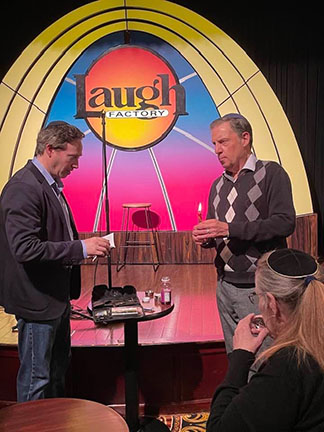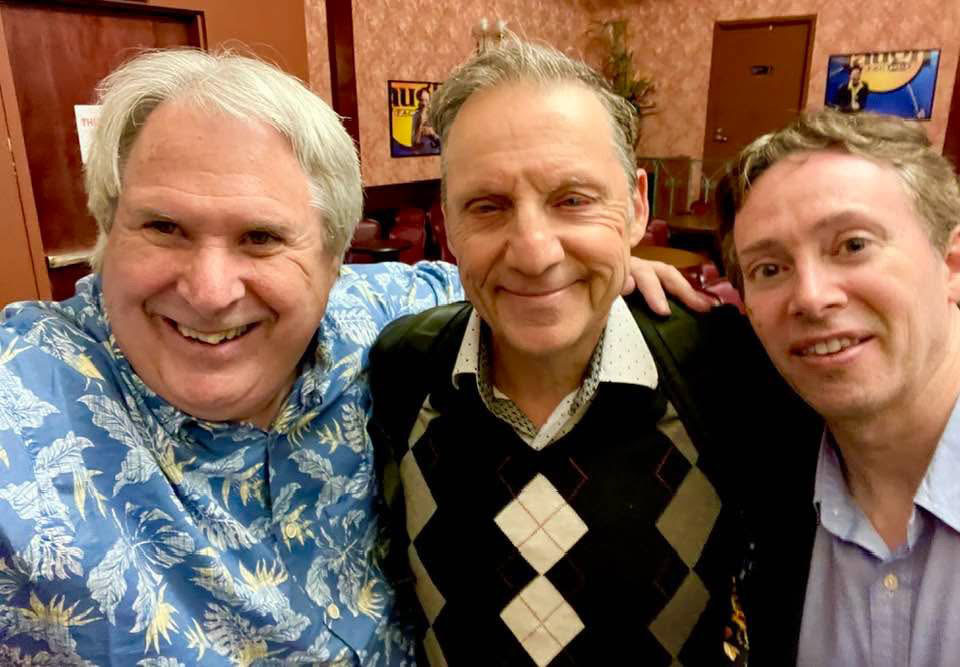Recently, a rare occurrence took place at the Laugh Factory Comedy Club in Reno, Nevada. I was booked alongside Avi Liberman and Howard Nave — a three-man lineup of funny Jews. In the late 1960s and ’70s, this was anything but rare. Time Magazine once estimated that 80% of stand-up comics back then were Jewish. Today, that number is down to maybe 30–40% — but still well above the 2–3% of Jews in the general U.S. population.
One significant difference I’ve noticed, though, is that Jewish comics of that earlier era often discussed being Jewish on stage. Today, that’s a rarity. Most of the old guard were secular, but they still seemed to know more about being Jewish than many of today’s comics.
Today, comedians born in the U.S. — or who come from India, Russia or Muslim countries — often discuss their cultural backgrounds and what it’s like living in America. Black comics, Asian comics and LGBTQ+ comics share their experiences openly. But unless the comics are from Israel and have an accent, most Jewish American comics stay quiet about being Jewish.
If the silence is about fitting in, we don’t need to go back far to see where fitting in got us. Europe didn’t exactly roll out the welcome mat when we attempted to fit in. And look what’s happening today at colleges like Columbia and Harvard — schools where many Jews try to blend in, only to find out they never really will.
So off I went to Reno for six shows with Howard and Avi. The day before Avi arrived, he had already prepared his chicken for Shabbos. After I got there, we walked to a nearby supermarket to pick up a few remaining supplies. That’s when Avi asked if I wanted to walk to Chabad on Shabbat morning. “We can have lunch with the rabbi and his family,” he said.
“How far is it?” I asked.
“About an hour each way.”
Now, it was in the mid-90s in Reno, and most of the walk would be in direct sunlight. I declined faster than if he’d asked to borrow 10 grand until he got his memory back. I had no interest in ending up like one of those desert carcasses with the bones picked clean. I said, “Since God is everywhere, I’ll see him in the casino.”
I asked if he was at least going to carry water. “Can’t,” he said. “There’s no eruv.”
That night, I asked how the walk went.
He said one word: “Brutal.”
Later that night, thanks to Avi, I found that even a comedy club can become a holy place. On Saturday night, after Shabbos, Avi asked if I wanted to do Havdalah at the club. I said yes. We invited Howard, and he agreed, too.
While Avi went to retrieve his Havdalah kit, I was approached by an elderly woman using a walker. (No, I didn’t ask her out — I’m married.) She came over to say how much she’d enjoyed the show. Her speech was a little slurred, like someone who might’ve had a stroke. Then I noticed she was wearing a kippah.
“What’s with the kippah?” I asked.
“I always wear it,” she said. “I wear it everywhere I go.”
She was a proud Jew.
 Then I heard a voice — God’s, I’m pretty sure — telling me to invite her to the front of the stage for Havdalah. The moment I suggested it she— excuse the expression — lit up like a Christmas tree. She called over her non-Jewish caretaker and another man who was Jewish. When she told him about Havdalah, he lit up too.
Then I heard a voice — God’s, I’m pretty sure — telling me to invite her to the front of the stage for Havdalah. The moment I suggested it she— excuse the expression — lit up like a Christmas tree. She called over her non-Jewish caretaker and another man who was Jewish. When she told him about Havdalah, he lit up too.
Standing at the front of the stage, we handed her the candle to hold. When Avi took out a little bottle of grape juice and began pouring, the man asked, “Is that just grape juice? I don’t drink.”
“You sober?” I asked.
“Yeah, 26 years.”
“Forty for me,” I told him.
After Havdalah, the woman said how meaningful it was to her, and the man agreed. “This made the trip extra special,” they said. We all hugged goodbye. I later wondered if, when they went back to gamble, God had a little extra mercy on them.
Mark Schiff is a comedian, actor and writer, and hosts, along with Danny Lobell, the “We Think It’s Funny” podcast. His new book is “Why Not? Lessons on Comedy, Courage and Chutzpah.”




